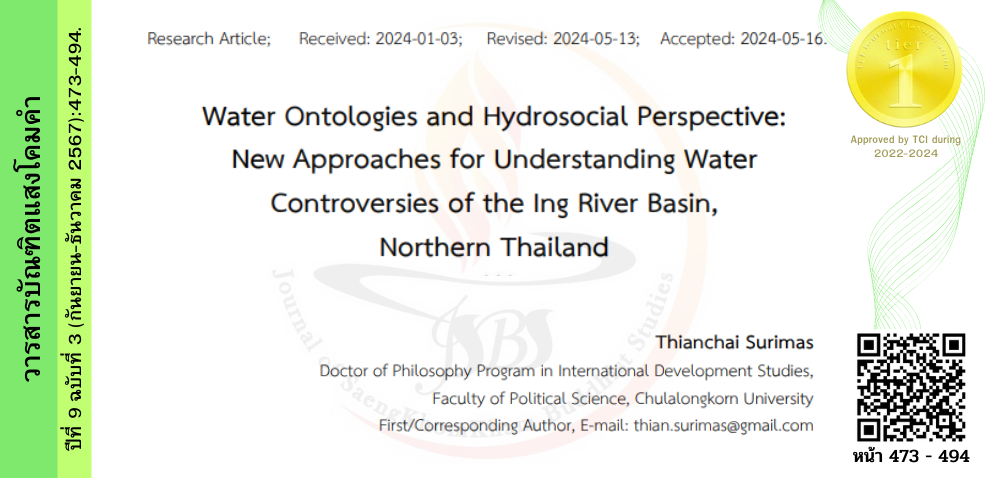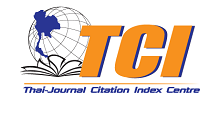Water Ontologies and Hydrosocial Perspective: New Approaches for Understanding Water Controversies of the Ing River Basin, Northern Thailand
คำสำคัญ:
Water-related Conflict, Modern Water, Living Water, Water Ontologies, Hydrosocial Perspectiveบทคัดย่อ
This research illustrates, through a hydrosocial perspective, how political contestation between different networks of actors reflected the meanings, values, and water ontologies. This research employs ethnography to study networks of actors involved in controversies over the hydraulic infrastructure project in the Ing River Basin. The network of project proponents, including a state-led hydraulic institution, experts, and other actors, see Water as merely a natural resource for economic development. The proponents reduce water to its materiality and physical dimensions. Water is tied with the idea of development that values large-scale infrastructure, and top-down bureaucratic management embodied scientific knowledge in controlling water, mainly for economic purposes. Meanwhile, project opponents, including civil society organizations, environmental NGOs, and some communities understand water as living. Living water is produced through Thai Baan research, ecological campaigns and ceremonial practices that show rivers as sacred. Living water is socially, environmentally, and culturally embedded and more than a resource for exploitation. This paper argues that water-related conflicts in the Ing River Basin not only reflect how water is managed but are also rooted in such ontological differences. Different networks produced different versions of water. Therefore, understanding water ontologies through a hydrosocial lens could provide a new perspective on water-related conflicts and controversies.
Downloads
เอกสารอ้างอิง
Blaser, M. (2009). The Threat of the Yrmo: The Political Ontology of a Sustainable Hunting Program. American Anthropologist. 111 (1), 10-20.
Blaser, M. (2013). Ontological Conflicts and the Stories of People in Spite of Europe: Towards a Conversation on Political Ontology. Current Anthropology. 54 (5), 547-568.
Buch-Hansen, M., et al. (2006). Rethinking Natural Resource Management in Thailand. Journal of Political Ecology. 13 (1), 48-59.
Chuengsatiansup, K. (2016). Science and Non-science: Anthropology at the Ontological Turn. Bangkok: Paragraph Publishing.
Descola, P. (2013). Beyond Nature and Culture. Chicago: University of Chicago Press.
Flaminio, S. (2021). Modern and Nonmodern Waters: Sociotechnical Controversies, Successful Anti-dam Movements and Water Ontologies. Water Alternatives. 14 (1), 204-227.
Fung, Z., et al. (2019). Mapping the Social Impacts of Small Dams: The Case of Thailand's Ing River Basin. Ambio. 48 (2), 180-191. DOI:10.1007/s13280-018-1062-7
Götz, J. M. and Middleton, C. (2020). Ontological Politics of Hydrosocial Territories in the Salween River Basin, Myanmar/Burma. Political Geography. 78, 102115.
Heis, A. and Vaddhanaphuti, C. (2020). Thai Baan Methodology and Transdisciplinarity as Collaborative Research Practices: Common Ground and Divergent Directions. Austrian Journal of South-East Asian Studies. 13 (2), 211-228.
Ing People Council. (n.d.). Strategy for the Ing River Basin and Policy Suggestion. Retrieved January 20, 2023, from http://www.ingcouncil.org/index.php/ing-stratergy
Lavau, S. (2013). Going with the Flow: Sustainable Water Management as Ontological Cleaving. Environment and Planning D: Society and Space. 31 (3), 416–433.
Linton, J. (2010). What is Water? The History of a Modern Abstraction. Vancouver: University of British Columbia Press.
Linton, J. (2014). Modern Water and Its Discontent: A History of Hydrosocial Renewal. Wires Water. 1 (1), 111-120.
Linton, J. and Budds, J. (2014). The Hydrosocial Cycle: Defining and Mobilizing a Relational Dialectical Approach to Water. Geoforum. 57, 170–180.
Manorom, K. (2022). Mekong Ontology. Bangkok: Sayam Publishing.
Medium Scale Irrigation Construction Office 2. (22 February 2022). Kean Charoen Regulator Dam Project. Retrieved March 20, 2024, form https://msc2.rid.go.th/th/report-and-information/water-resource-development-mission/chiang-rai9/test-3/work-in-progress14/2022-02-22-07-36-07
Mekong Community Institute. (11 February 2019). Ing People Council. Retrieved October 20, 2022, from https://www.youtube.com/watch?v=RLl6j4RkPBo
Middleton, C. (2022). The Political Ecology of Large Hydropower Dams in the Mekong Basin: A Comprehensive Review. Water Alternatives. 15 (2), 251-289.
Mol, A. (1999). Ontological Politics: A Word and Some Questions. The Sociological Review. 47 (1_suppl), 74–89.
Ngaonoi, K., et al. (2019). Water Management in the Ing River Basin for Inclusivity and Sustainability. Chiang Mai: Wanida Kanpim.
Pomun, T. (2020). The Creation of Body of Folk Wisdom Based on Taibaan Research. Journal of SaengKhomKham Buddhist Studies. 4 (2), 165-177.
RID. (2013). Feasibility Study on Water Resources Development in the Ing River for Water Shortage and Flood Mitigation in Phayao-Chiang Rai Provinces. Bangkok: Royal Irrigation Department.
RID. (2021). Plan for Development Projects in the Ing River. Bangkok: Royal Irrigation Department.
Sangkhamanee, J. (2010). The Hydraulics of Power and Knowledge: Water Management in Northeastern Thailand and the Mekong Region. (Doctoral Dissertation). The Australian National University, Canberra.
Santasombat, Y. (2011). The River of Life. Chiang Mai: Mekong Press.
Swyngedouw, E. (1999). Modernity and Hybridity: Nature, Regeneracionismo, and the Production of the Spanish Waterscape, 1890-1930. Annals of the Association of American Geographers. 89 (3), 443-465.
Thaipost. (22 March 2022). The Protestation over the Yuam River Project. Retrieved September 10, 2023, from https://www.thaipost.net/district-news/109682/
Transborder News. (11 May 2022). To Join Forces for Filling a Case to the Administrative Court of Thailand. Retrieved September 10, 2023, from https://transbordernews.in.th/home/?p=31465
Wajjwalku, S. (2019). Civil Society and Water Governance in Northern Thailand: Local NGOs and Management of Mekong’s Tributaries in Chiang Rai. In Otsuka, K. (eds.). Interactive Approaches to Water Governance in Asia. (pp. 123-154). Singapore: Springer.
Wilson, N. J. and Inkster, J. (2018). Respecting Water: Indigenous Water Governance, Ontologies, and the Politics of Kinship on the Ground. Environment and Planning E: Nature and Space. 1 (4), 516-538.
Wises, S. (2019). People Council of Ing River Basin: Civil Society Dynamic in Natural Resource Management in Ing River Basin. Journal of Buddhist Studies. 10 (2), 331-345.
Wises, S. (2023). Community Legal Empowerment for the Application of Ramsar Convention to the Lower Ing Basin Wetlands in Chiang Rai Province. King Prajadhipok’s Institute Journal. 21 (1), 30–58.
Yamsiri, T. (2014). Water Management in Thailand: Dams and the Voice of the Affected and Displaced People. In Gemenne, F., et al. The State of Environmental Migration 2014: A Review of 2013. (pp. 235-251). Geneva: International Organization for Migration (IOM).
Yates, J. S., et al. (2017). Multiple Ontologies of Water: Politics, Conflict and Implications for Governance. Environment and Planning D: Society and Space. 35 (5), 797-815.
Yong, M. L. (2020). Reclaiming Community Spaces in the Mekong River Transboundary Commons: Shifting Territorialities in Chiang Khong, Thailand. Asia Pacific Viewpoint. 61 (2), 203-218.

ดาวน์โหลด
เผยแพร่แล้ว
รูปแบบการอ้างอิง
ฉบับ
ประเภทบทความ
สัญญาอนุญาต
ลิขสิทธิ์ (c) 2024 วารสารบัณฑิตแสงโคมคำ

อนุญาตภายใต้เงื่อนไข Creative Commons Attribution-NonCommercial-NoDerivatives 4.0 International License.





